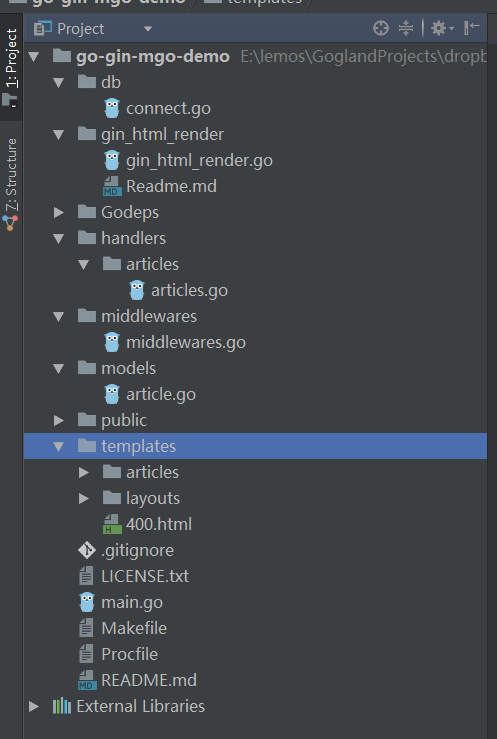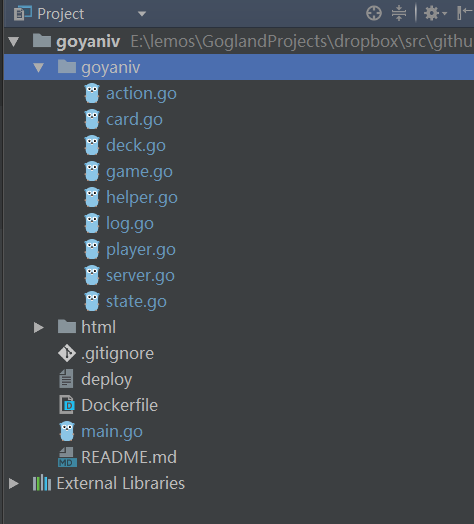概述
一般的 web项目,主要两点:路由 和 数据库。围绕这两点之外就是业务逻辑。下面以几个例子简单谈谈 web项目的封装逻辑。
封装方式一、路由写在 main函数中,数据库初始连接放在 init() 函数中。地址

func init() {
db.Connect()
}
func main() {
// Configure
router := gin.Default()
// Set html render options
htmlRender := GinHTMLRender.New()
htmlRender.Debug = gin.IsDebugging()
htmlRender.Layout = "layouts/default"
// htmlRender.TemplatesDir = "templates/" // default
// htmlRender.Ext = ".html" // default
// Tell gin to use our html render
router.HTMLRender = htmlRender.Create()
router.RedirectTrailingSlash = true
router.RedirectFixedPath = true
// Middlewares
router.Use(middlewares.Connect)
router.Use(middlewares.ErrorHandler)
// Statics
router.Static("/public", "./public")
// Routes
router.GET("/", func(c *gin.Context) {
c.Redirect(http.StatusMovedPermanently, "/articles")
})
// Articles
router.GET("/new", articles.New)
router.GET("/articles/:_id", articles.Edit)
router.GET("/articles", articles.List)
router.POST("/articles", articles.Create)
router.POST("/articles/:_id", articles.Update)
router.POST("/delete/articles/:_id", articles.Delete)
// Start listening
port := Port
if len(os.Getenv("PORT")) > 0 {
port = os.Getenv("PORT")
}
router.Run(":" + port)
}封装方式二、路由和 db单独封装到一个函数中,以传参的形式将路由传给另一个函数。地址

func SetUpServer() {
r := gin.Default()
// secret 相当于签名
store, _ := sessions.NewRedisStore(10, "tcp", CONFIG.Redis.Host, CONFIG.Redis.Password, []byte(CONFIG.Server.Secret))
r.Use(sessions.Sessions("session", store))
r.Use(gin.Recovery())
r.Use(Uniquify())
r.LoadHTMLGlob("templates/*")
r.Static("/static", "public/")
SetUpRoutes(r)
r.GET("/incr", func(c *gin.Context) {
c.JSON(200, gin.H{"count": c.MustGet("key").(string)})
})
// var port string
r.Run(":" + CONFIG.Server.Port)
}封装三、将路由等封装到 Server struct 中。对此 Server 创建一个 new函数,路由等相关内容只包含在方法中。(面向对象)地址

type Server struct {
Ws *melody.Melody
Routes *gin.Engine
Games []*Game
}
func New() *Server {
ws := melody.New()
routes := gin.Default()
games := make([]*Game, 0)
return &Server{
Ws: ws,
Routes: routes,
Games: games,
}
}
...
...
func (srv *Server) RoutesInit() {
srv.Routes.GET("/jq.js", func(c *gin.Context) {
http.ServeFile(c.Writer, c.Request, "html/jq.js")
})
srv.Routes.GET("/goyaniv.js", func(c *gin.Context) {
http.ServeFile(c.Writer, c.Request, "html/goyaniv.js")
})
srv.Routes.GET("/game/:name", func(c *gin.Context) {
cookiekey, _ := c.Request.Cookie("goyanivkey")
cookieid, _ := c.Request.Cookie("goyanivid")
if cookieid == nil || cookiekey == nil {
cookieid := CreateCookie("goyanivkey", GenerateUnique())
cookiekey := CreateCookie("goyanivid", GenerateUnique())
http.SetCookie(c.Writer, cookieid)
http.SetCookie(c.Writer, cookiekey)
}
http.ServeFile(c.Writer, c.Request, "html/game.html")
})
srv.Routes.GET("/gamedev/:name", func(c *gin.Context) {
cookiekey, _ := c.Request.Cookie("goyanivkey")
cookieid, _ := c.Request.Cookie("goyanivid")
if cookieid == nil || cookiekey == nil {
cookieid := CreateCookie("goyanivkey", GenerateUnique())
cookiekey := CreateCookie("goyanivid", GenerateUnique())
http.SetCookie(c.Writer, cookieid)
http.SetCookie(c.Writer, cookiekey)
}
http.ServeFile(c.Writer, c.Request, "html/gamedev.html")
})
srv.Routes.GET("/game/:name/ws", func(c *gin.Context) {
srv.Ws.HandleRequest(c.Writer, c.Request)
})
srv.Routes.GET("/gamedev/:name/ws", func(c *gin.Context) {
srv.Ws.HandleRequest(c.Writer, c.Request)
})
srv.Ws.HandleMessage(func(s *melody.Session, msg []byte) {
FireMessage(srv, s, msg)
})
srv.Ws.HandleDisconnect(func(s *melody.Session) {
FireDisconnect(srv, s)
})
srv.Ws.HandleConnect(func(s *melody.Session) {
FireConnect(srv, s)
})
}
func (s *Server) Run() {
s.RoutesInit()
s.Routes.Run(":5000")
}
有疑问加站长微信联系(非本文作者)





